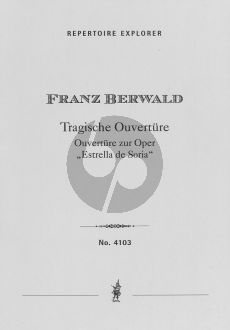Tragic Overture, Ouverture to the opera Estrella de Soria Score - Franz Berwald
Bladmuziek
Componist(en):
Uitgever('s):
Uitgavenummer:
4103
Ontvang 1.150 Poppels bij dit product
Poppel spaarpunten
Wat zijn Poppel spaarpunten?
Wanneer u bij Broekmans een aankoop doet, spaart u automatisch voor extra korting op uw volgende bestelling. Op de informatiepagina van ieder product staat hoeveel spaarpunten u ontvangt bij aankoop van het betreffende product. Nadat de betaling van uw aankoop bij ons is bevestigd, worden de spaarpunten direct in uw account bijgeschreven. Deze punten kunt u heel eenvoudig inwisselen voor korting. Per bestelling is het mogelijk om op deze manier tot 17,50 euro aan spaarpunten inwisselen.
Je kunt alleen Poppels sparen/inwisselen op bestellingen via de website, je dient dan wel ingelogd te zijn op je account.
Overzicht korting:
| Aantal Poppels | Korting |
|---|---|
| 2500 | € 1 |
| 5000 | € 2 |
| 10000 | € 4 |
| 20000 | € 8 |
Waar kan ik Poppels sparen?
- Per aangeschaft product ontvangt u spaarpunten. De hoeveelheid is terug te vinden op de informatiepagina van het product. (Er zijn regelmatig acties waarbij er op bepaalde producten extra poppels worden toegekend.)
- Regelmatig doen we acties waarbij je op bepaalde producten extra spaarpunten ontvangt.
Hoe kan ik Poppels inwisselen?
Wanneer u spaarpunten heeft gespaard, kunt u bij een bestelling kiezen om de spaarpunten in te wisselen voor korting. De korting wordt direct toegepast in uw winkelwagen. Om de spaarpunten in te wisselen gaat u als volgt te werk:
1. Voeg de product(en) die u wilt bestellen toe aan uw winkelwagen.

2. Log in op de website met uw e-mail adres en wachtwoord
3. Klik in uw winkelwagen op ‘Poppels inwisselen’. Hier staat hoeveel spaarpunten u heeft en
via het dropdown menu kunt u kiezen hoeveel punten er ingewisseld moeten worden.
4. Kies het aantal spaarpunten dat u wilt inwisselen en klik op ‘doorgaan’.
Veelgestelde vragen
Vraag: ‘Waar kan ik vinden hoeveel poppels ik heb gespaard?’
Antwoord: Ga naar ‘Mijn account’ en klik op het tabje ‘Spaarpunten’.
Hier staat hoeveel spaarpunten u heeft. Tevens ziet u ook een overzicht van alle bij- en afschrijvingen.
Vraag: ‘Ik heb een kortingsbon, kan ik deze inwisselen voor Poppels?’
Antwoord: Ja dit kan. Neem hiervoor telefonisch contact met ons op, wij zetten de code dan om in poppels.
Vraag: ‘Ik heb poppels en wil een kortingsbon, kan ik dit omwisselen?’
Antwoord: Ja, u kunt in onze webshop cadeaubonnen kopen en daarbij poppels gebruiken om de bestelling af te betalen.






